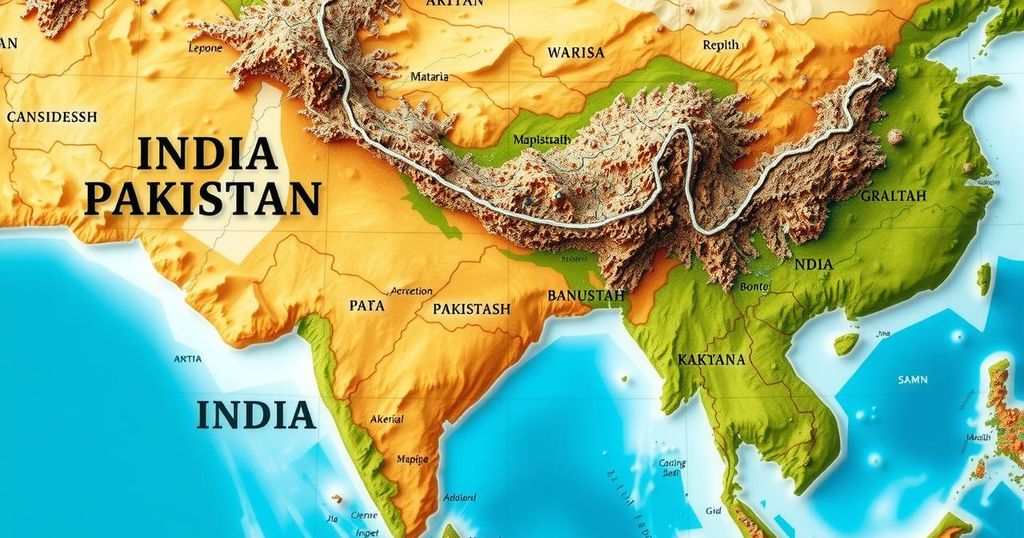This article discusses the recent warming of relations between Bangladesh and Pakistan, particularly following political changes in Bangladesh. Key developments include direct trade initiatives, military cooperation, and historical tensions stemming from the 1971 independence war. India’s response and concerns regarding this shift are also examined, highlighting the significance of a stable Bangladesh for regional security.
The evolving relationship between Bangladesh and Pakistan has drawn the attention of India, particularly following significant political changes in Bangladesh, including the ousting of Prime Minister Sheikh Hasina last year. For the first time in decades, Dhaka and Islamabad have initiated direct trade, with Bangladesh importing 50,000 tonnes of rice from Pakistan. Additional developments include the resumption of direct flights, simplified visa processes, and renewed military cooperation.
Historically, the rivalry between Bangladesh and Pakistan dates back to the 1971 independence struggle, which led to Bangladesh’s birth with India’s support. Although tensions subsisted, the relationship saw a brief phase of warmth during 2001-2006. However, during Hasina’s lengthy tenure starting in 2009, her close ties with India distanced her government from Pakistan. Recent protests against Hasina may have prompted this thawing of relations.
According toformer Bangladeshi diplomat Humayun Kabir, the relationship between Pakistan and Bangladesh appears to be mending, signaling a return to normalcy. Subsequent developments have been closely monitored by India, given its historically strained relations with Pakistan. Bangladesh’s ties with India reportedly cooled following Hasina’s departure, exacerbated by Delhi’s reluctance to comply with Dhaka’s demands regarding extradition for various charges against Hasina.
Some experts view the rekindling of ties as a strategic maneuver against India’s influence. Ayesha Siddiqa, a senior research fellow, asserts that the partnership is currently tactical, suggesting a collective effort to counter Indian dominance. Important diplomatic meetings between Bangladeshi interim Prime Minister Muhammad Yunus and Pakistan’s Prime Minister Shehbaz Sharif have been observed, alongside growing military exchanges, including high-level military visits and joint exercises.
Veena Sikri, a former Indian high commissioner to Bangladesh, likened the current developments to a “déjà vu” situation, highlighting prior concerns regarding India-related insurgents operating with alleged support from Pakistan. Although the borders between India and Bangladesh present vulnerabilities for cross-border insurgency, Hasina’s government previously worked to suppress such activities. Thus, the resurgence of military ties between Bangladesh and Pakistan is a significant concern for India.
Despite Indian fears, Bangladeshi diplomats maintain the necessity for resolving historical grievances from the 1971 conflict before a normalization of relations can occur. Bangladesh has consistently demanded an apology from Pakistan for atrocities committed during the independence war, yet Islamabad has shown little intention of addressing these issues. Former Pakistani military officer Ikram Sehgal also emphasizes the necessity for both nations to acknowledge their respective historical grievances.
While tensions linger over historical injustices, economists argue that both nations can initially enhance their bilateral trade, which remains low at under $700 million, heavily favoring Pakistan. Experts encourage easing trade restrictions to tap into the potential market constituted by Pakistan’s sizeable population. Discussions during upcoming diplomatic meetings may address these economic barriers amidst the backdrop of impending elections in Bangladesh and potential shifts in foreign policy priorities.
Thus, the implications of this evolving dynamic remain significant for India, which views a stable and amicable Bangladesh as crucial for maintaining security and stability in its northeastern regions.
The recent thawing of relations between Bangladesh and Pakistan marks a notable shift in regional geopolitics, especially concerning India’s interests. While both countries have initiated measures to enhance bilateral trade and military cooperation, historical grievances from the 1971 independence war remain a potential obstacle to normalization. As regional developments unfold, the stakes continue to rise for India, which is keen on ensuring stability in Bangladesh amidst the evolving dynamics of South Asia.
Original Source: www.bbc.com






